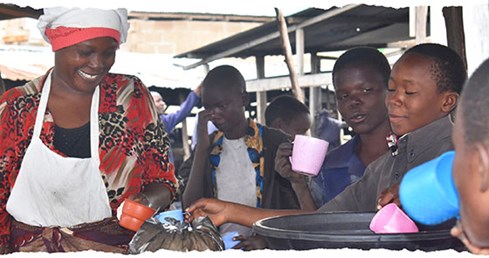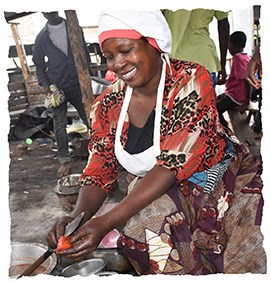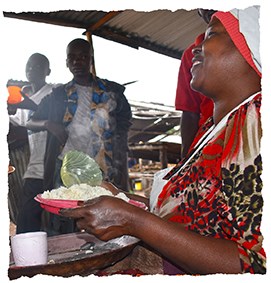
These are the champions: empowering local communities to look out for children
- Date: 29 March 2019
- Author: Henry Mazunda
- In: Tanzania


Railway Children Africa has teams of outreach workers looking for children living and working on the streets across six cities. But we cannot be there all the time, and unfortunately so many of the children we work with are. So we have been identifying and empowering ‘champions’ from within the community - ordinary people who are now dedicating their limited resources and time to help these children.
We give them some basic training and information and they then offer the children food, give them a place to sit in safety, offer advice and someone to talk to and refer them to us for further support. Their reassuring presence can provide vital comfort to these children, and mark the first step in the journey to leaving street life behind. I was keen to meet these generous people, who receive no pay or incentive and do this purely out of the goodness of their hearts, for myself.
My first port of call is the Nyegezi Township, 10km south of Mwanza City, where I'm greeted with the beaming smile of a middle aged woman, Mwanamaza, a local Swahili slang for ‘our mother’. She runs a small food vending business at the market, which is clearly not making her a fortune but doesn’t stop her from immediately offering me a cup tea and two pieces of chapatti. There were more than a dozen children around the stall that took turns to greet me excitedly.

“Meet my children. These are just some. The others have gone to the bus station to wash buses and cars but they will be back here later for lunch,” said Mwanamaza proudly as she fills the small cups with tea for the children. Street life is hell for them. Many are too young to withstand the harsh conditions.” The children tell 45-year-old Mwanamaza, whose real name is Yusta, about challenges they face.
“The police and security guards beat us mercilessly”, says one 13-year-old boy. “They don’t want to see us around. Just yesterday, my friend was beaten nearly to death for insulting a security guard who was chasing him.”
“As you can see,” Mwanamaza continues, “These children have no parental care, they are shabbily dressed and look rough. Some smoke marijuana and drink alcohol and they have no respect for people… but how can they when those people don’t seem to care about them? Most people around here have no regard for these children.
They don’t want to see them, let alone hear their stories.
“They treat them as criminals. But we are working together with local community leaders, with Railway Children and with other organisations to change the negative perceptions.”
Nyegezi has seen an increase in children on the streets recently. Mwanamaza says at least 30 children and youths visit her makeshift restaurant every day, many straight from the bus station nearby having just arrived in the city from neighbouring districts. As soon as she spots them she talks to them, trying to understand their situations and their reasons for leaving home. She tries to find out if they are willing to be supported to go back home. Then she contacts Railway Children and lets us know about any children new to the streets.
Mwanamaza shows these children a generosity and tenderness many will never have experienced before. When the children don’t have any money, she gives them food for free, or on credit so they pay when they can.

“Of course some never pay. And some pay after a long delay. But I don’t mind. I understand the situation they are in,” she says. “I go home with Tsh.40,000 ($18), on a good day or less than Tsh.20,000 (US$9) on a bad day but these are my best friends and my best customers. Often they help me with some simple chores such as cleaning, collecting water and carrying supplies. To earn money the children collect scrap metal and plastic bottles which they sell. Some of them wash cars and buses. Others carry goods for customers at the market and use the money they get to buy food or pay their debts,” said Mwanamaza.
If they make a bit of extra money the children trust Mwanamaza to keep it safe for them so it doesn’t get stolen by older boys on the streets. Despite giving such a huge support to these children, Mwanamaza, a divorced mother of four children, still faces her own hardships and often struggles to make ends meet.
“I’ve raised my four children as a single parent. I’ve failed to earn enough to help them access proper education but I am trying to work really hard so my youngest can at least study for a bit longer,” said Mwanamaza. “But this is no excuse for me not supporting the most vulnerable people in society like these street children. You don’t have to be rich to help them. I’m just happy with whatever small contribution I’m making to them to improve their lives.”
Champions like Mwanamaza are providing a vital link to our support for the thousands of children fighting for survival on the streets of East Africa. Without their help, allowing us to reach these vulnerable children sooner, so many more would be lost to a life on the streets for good.